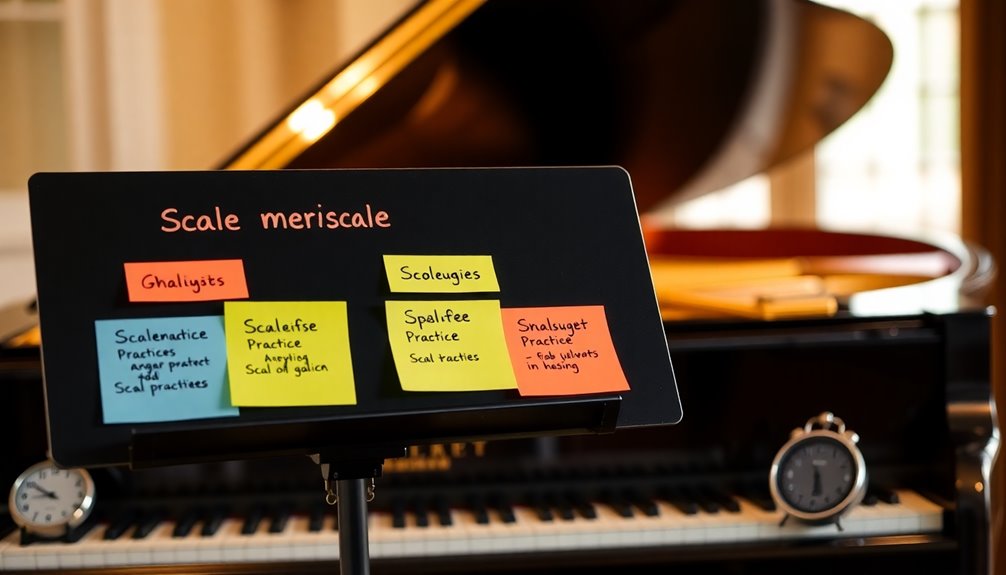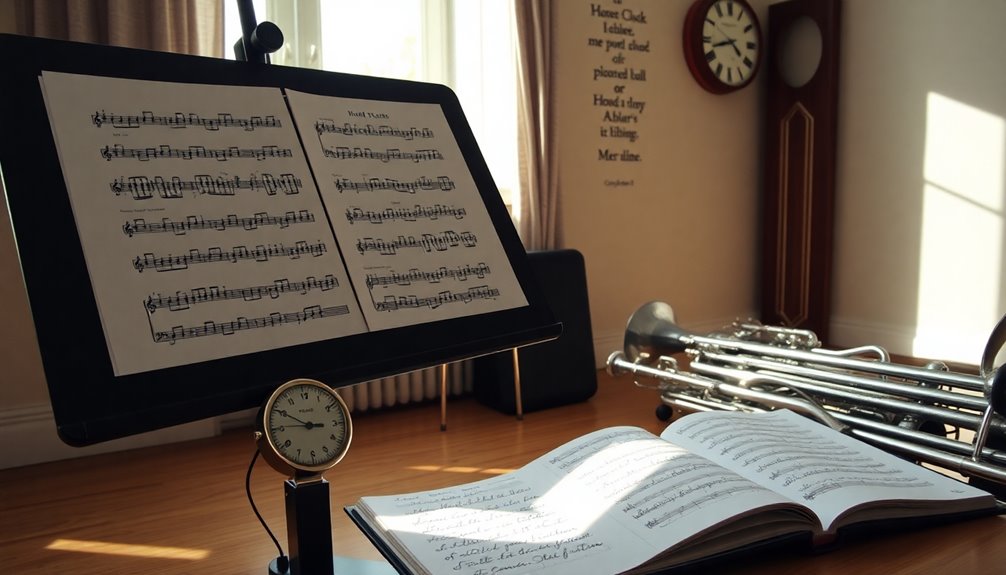To achieve scale practice success, start by setting clear goals. Break these down into manageable tasks to track your progress. Next, establish a structured routine, dedicating specific days to different scales while keeping flexibility in mind. Focus on proper technique by practicing slowly and maintaining good posture to build muscle memory. Incorporate varied exercises, exploring different scales and rhythms to keep your practice engaging. Finally, track your progress in a journal, celebrating milestones along the way. By following these tips, you'll enhance your skills and confidence, and there's even more valuable insights just ahead!
Key Takeaways
- Set clear, specific goals to create a structured roadmap for your scale practice and track your progress.
- Establish a consistent practice routine, dedicating specific days to focus on different scales while allowing for flexibility.
- Prioritize proper technique, focusing on finger placement and posture to build muscle memory and prevent strain.
- Incorporate varied exercises and improvisation to enhance your understanding and application of scales.
- Keep a progress journal to document achievements, celebrate milestones, and assess your growth regularly.
Set Clear Goals

Setting clear goals is like laying the foundation for your musical journey. When you establish specific objectives, you create a roadmap that guides your practice and helps you measure your progress. Start by identifying what you want to achieve with your scale practice. Are you aiming to master a particular scale, improve your speed, or enhance your tone? By pinpointing these goals, you'll have a clearer vision of what success looks like for you.
Next, think about your achievement strategies. Break down your goals into smaller, manageable tasks. For instance, if you want to master the major scale, set a goal to practice it for ten minutes a day. This way, you're not overwhelmed, and you can maintain a sense of accomplishment with each session.
Use a practice journal to track your progress and celebrate small victories along the way. Incorporating consistent practice schedules can also significantly enhance your progress and discipline.
Remember, goal setting isn't just about reaching the finish line; it's about enjoying the journey. Share your goals with fellow musicians or friends who understand your passion. This sense of community can provide encouragement and accountability, making your practice feel more connected and supportive.
Ultimately, setting clear goals and employing effective achievement strategies can elevate your scale practice. With each step you take, you'll not only improve your skills but also foster a deeper sense of belonging within the musical community.
Create a Structured Routine

When you consistently dedicate time to practice, creating a structured routine can greatly enhance your scale work. A well-organized approach not only keeps you focused but also helps you manage your time effectively. Remember, flexibility within your routine is necessary; it allows you to adapt to unexpected changes while still prioritizing your scale practice.
Here's a simple framework to help you establish your routine:
| Day | Focus Area |
|---|---|
| Monday | Major scales |
| Wednesday | Minor scales |
| Friday | Chromatic scales |
| Sunday | Review & improvise |
By dedicating specific days to different focus areas, you're ensuring that your practice is varied and engaging. This routine promotes accountability and encourages you to stay committed. However, don't hesitate to adjust your schedule if life throws you a curveball; routine flexibility is vital for sustained progress. Additionally, incorporating specific goals into your practice sessions can enhance your focus and drive improvement.
Make sure to set aside time each day that works best for you, even if it's just 15 minutes. The key is consistency. By managing your time well, you'll find yourself making significant gains in your scale proficiency and overall musicianship. Remember, you're not alone in this journey; many musicians share similar struggles and triumphs. Embrace your progress, and keep pushing forward!
Utilize Proper Technique

Mastering scales isn't just about hitting the right notes; it's vital to focus on utilizing proper technique to develop your skills effectively. By paying attention to finger placement and posture alignment, you'll enhance your playing and make scale practice more rewarding.
First, let's discuss finger placement. Confirm your fingers are curved and positioned over the keys or strings naturally. This will allow for smooth shifts between notes, reducing tension and fatigue. Practice slowly at first, concentrating on each finger's movement. Don't rush; building muscle memory is key. As you gain confidence, gradually increase your speed while maintaining accuracy.
Next, posture alignment plays an important role in your technique. Sit or stand tall, keeping your back straight and shoulders relaxed. Your arms should be positioned comfortably, allowing your fingers to move freely. This posture not only prevents strain but also enhances your control over the instrument. When you're properly aligned, you'll find it easier to execute scales and other musical passages. Additionally, engaging your core muscles will support your breath control, which is essential for maintaining steady airflow during scale practice.
Incorporate Varied Exercises

Variety in practice can greatly enhance your scale work, keeping your sessions engaging and productive. When you incorporate varied exercises, you'll not only develop your technical skills but also deepen your understanding of music theory. Start by exploring scale variations; instead of sticking to the same major and minor scales, try incorporating pentatonic or chromatic scales. These variations offer fresh perspectives and can inspire creativity in your playing.
Next, consider mixing exercise combinations. For example, alternate between playing scales with different rhythms or articulations. You might play a scale legato one day and staccato the next, or even apply various dynamics as you progress. This not only keeps your practice sessions lively but also helps you master control and expression in your playing.
Don't hesitate to include improvisation as part of your practice. As you play through your scale variations, experiment with improvising melodies. This can reinforce your understanding of scales and deepen your connection with music. Additionally, incorporating mindful breathing before practice can help center your focus and enhance your overall performance.
Group your exercises into structured practice sessions, dedicating time to each type of scale variation and exercise combination. This approach guarantees a thorough learning experience, making you feel accomplished and motivated.
Track Your Progress

Tracking your progress is essential for growth in scale practice. It helps you identify where you excel and where you need improvement. By keeping a progress journal, you can document your practice sessions, noting the scales you've mastered and the challenges you've faced. This not only provides a clear overview of your journey but also serves as a motivational tool.
As you progress, don't forget to celebrate your milestones. Whether it's playing a scale flawlessly for the first time or reaching a new speed, these achievements deserve recognition. Celebrate these moments to reinforce your commitment and boost your confidence. You might want to share your accomplishments with fellow musicians or friends, creating a sense of belonging in your musical community.
When you look back at your progress journal, you'll see how far you've come, which can be incredibly empowering. Consider setting specific goals for your practice, and regularly review your journal to track your success. Incorporating different articulations into your scale practice will further enhance your musicality and technical proficiency.
This reflection not only highlights your dedication but also helps you adjust your practice strategies to guarantee continuous growth.
Frequently Asked Questions
How Long Should I Practice Scales Each Day?
When it comes to scale duration, aim for about 15 to 30 minutes each day.
This consistent practice frequency helps you build muscle memory and improve your technique.
It's important to keep your sessions focused and varied to stay engaged.
Don't rush; quality matters more than quantity.
Celebrate your progress along the way, and remember, every bit of practice brings you closer to your goals.
You're part of a community working for growth together!
What Is the Best Time to Practice Scales?
The best time to practice scales really depends on your personal schedule and energy levels.
Morning sessions can be great for starting your day with focus and clarity, while evening routines might suit those who prefer winding down with music.
Experiment with both to see what feels right for you.
Consistency is key, so find a time that fits comfortably into your routine, making it easier to develop your skills and enjoy the process.
Can I Practice Scales on Different Instruments?
Absolutely, you can practice scales on different instruments! Embracing inter-instrument versatility helps you adapt your scales, enhancing your overall musicianship.
Each instrument offers unique challenges and insights, enriching your practice experience. As you adapt scales from one instrument to another, you'll develop a deeper understanding of music theory and technique.
Don't hesitate to explore; it's a rewarding journey that fosters a sense of belonging in the musical community. Keep pushing your boundaries!
How Do I Stay Motivated During Scale Practice?
Staying motivated during scale practice can be tough, but it's essential for progress.
Start by setting clear, achievable goals that you can measure. Break your practice into manageable chunks, and incorporate a reward system for each milestone you hit.
Celebrate small wins to keep your spirits high. Remember, you're not alone on this journey; connecting with others who share your passion can also boost your motivation and create a sense of belonging.
Should I Use a Metronome for Scale Practice?
Using a metronome for scale practice can really enhance your timing techniques. It helps you develop a steady rhythm, which is essential for playing smoothly.
Start slow to guarantee you're hitting the right notes, then gradually increase the tempo as you gain confidence.
Plus, practicing with a metronome can keep you accountable and motivated. You'll feel a sense of belonging in the music community as you improve your timing and performance skills!
Conclusion
By following these tips, you're setting yourself up for scale practice success. Did you know that musicians who track their progress are 30% more likely to reach their goals? This statistic shows the power of consistency and reflection in your practice. Remember, it's not just about hitting the right notes; it's about the journey and growth you experience along the way. Stay committed, keep challenging yourself, and watch your skills soar!






